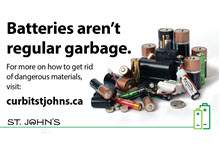Batteries are Hazardous Waste

Disposing of household hazardous wastes in regular garbage could cause a potentially serious issue at the landfill – or in your community.
Since 2019 there have been 46 fires at the landfill, the majority of which have been caused by improper disposal of household hazardous wastes. Five of these fires were so serious that the St. John's Regional Fire Department had to be called in to assist with the suppression efforts.
Public Works estimates 65% of the fires at the Robin Hood Bay landfill are caused by:
- 30% lithium-ion (rechargeable) batteries
- 15% household chemicals
- 20% marine flares
Never put lithium-ion batteries in the garbage; these are rechargeable batteries often found in cell phones, laptops, cordless tools like drills, battery powered mowers, grass trimmers and ride-on toys. Lithium-ion batteries are very flammable once damaged or compressed; waste is compressed or compacted in the garbage trucks and on the landfill. Lithium-ion batteries should be stored separately from alkaline batteries.
Across North America there has been a recent jump in landfill fires and fires at Material Recovery (recycling) Facilities as a result of lithium-ion batteries.
Before you throw away flammable materials and potential source of ignition, check to see how to dispose of it safely at curbitstjohns.ca or in our waste app St. John's Waste and Recycling.
The City offers a twice-weekly opportunity to dispose of hazardous materials at the Household Hazardous Waste Depot at the Robin Hood Bay Waste Management Facility at 340 East White Hills Road – every Wednesday and Saturday from 8 a.m. to 4 p.m.
For more on what is accepted at the Household Hazardous Waste Depot go to curbitstjohns.ca
